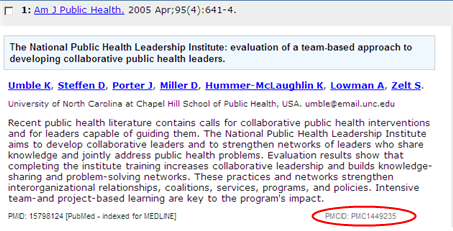 HSLS offers library orientations and classes on database searching, software applications such as Adobe Photoshop, bibliographic management, molecular biology and genetics. For more information visit the online course descriptions.
HSLS offers library orientations and classes on database searching, software applications such as Adobe Photoshop, bibliographic management, molecular biology and genetics. For more information visit the online course descriptions.
Classes are held on the first floor of Falk Library (200 Scaife Hall) in classroom 1 and conference room B, and on the second floor in the Computer and Media Center classroom 2. Some classes are also held at the Western Psychiatric Institute and Clinic (WPIC) Library classroom.
Class schedules are subject to change. Please consult the online class calendar for the most current information.
All classes are open to faculty, staff and students of the schools of the health sciences at the University of Pittsburgh and UPMC. No registration is required. Seating for classes is first-come, first-served, until the class is full. Classes marked with an asterisk (*) qualify for American Medical Association Category 2 continuing education credit.
HSLS ORIENTATION
Introduction to HSLS Resources and Services at Falk Library
(Meet inside entrance to Library)
Thursday, September 11 1-2 p.m.
Also offered upon request to groups or individuals. Call 412-648-8796.
Introduction to HSLS Resources and Services at WPIC Library
(Meet inside entrance to Library)
Thursday, September 25 9:30-10:30 a.m.
Also offered upon request to groups or individuals. Call 412-246-5507.
SEARCHING DATABASES
PubMed Basics* (Falk Library Classroom 1)
Wednesday, September 10 9-10:30 a.m.
Wednesday, September 24 10-11:30 a.m.
Thursday, October 23 10-11:30 a.m.
Transitioning to Ebsco CINAHL* (Falk Library Classroom 1)
Monday, September 8 9-10:30 a.m.
Wednesday, October 8 10:30 a.m.-noon
Searching PsycINFO* (WPIC Library Classroom)
Tuesday, October 14 9:30-11 a.m.
Measuring Health: Finding Mental Measurement Tools*(WPIC Library Classroom)
Monday, September 15 10 a.m.-11:30 a.m.
MOLECULAR BIOLOGY AND GENETICS RESOURCES
Genetic Information Resources* (Falk Library Conference Room B)
Wednesday, September 10 1-3 p.m.
Protein Information Resources* (Falk Library Conference Room B)
Wednesday, September 17 1-3 p.m.
Genome Information Resources* (Falk Library Conference Room B)
Wednesday, September 24 1-3 p.m.
Vector NTI Advance* (Falk Library Conference Room B)
Wednesday, October 1 1-3 p.m.
Pathway Analysis Tools* (Falk Library Conference Room B)
Wednesday, October 8 1-3 p.m.
Sequence Similarity Searching* (Falk Library Conference Room B)
Wednesday, October 22 1-3 p.m.
Genetic Variation Resources* (Falk Library Conference Room B)
Wednesday, October 29 1-3 p.m.
SOFTWARE TRAINING
EndNote Basics (Falk Library Classroom 2)
(Note: This class is usually full. Please arrive 15 minutes in advance to ensure seating.)
Tuesday, September 9 1:30-3:30 p.m.
Friday, September 26 10 a.m.-noon
Monday, October 13 10 a.m.-noon
Thursday, October 23 1-3 p.m.
Adobe Photoshop for Beginners
Thursday, September 4 10 a.m.-noon (Falk Library Classroom 2)
Thursday, September 18 10 a.m.-noon (WPIC Library Classroom)
Thursday, October 16 10 a.m.-noon (Falk Library Classroom 2)
Advanced PowerPoint for Presentations
Thursday, September 25 10 a.m.-noon
PowerPoint for Beginners and Advanced PowerPoint (Falk Library Classroom 2)
Thursday, October 30 10 a.m.-2 p.m.
The WOW Factor: PowerPoint for Posters
Tuesday, October 7 10-11:30 a.m. (WPIC Library Classroom)
Tuesday, October 21 10-11:30 a.m. (Falk Library Classroom 2)
LUNCH WITH A LIBRARIAN
These informal, brown-bag lunches are held in Falk Library Conference Room B. Bring your own lunch. Drinks and dessert are provided. For more information visit the online descriptions.
A Wealth of (Information) Treasures Awaits You: Navigating the HSLS Web Site
Tuesday, September 9 Noon-1 p.m.
Customize Google to Work for You
Monday, September 22 Noon-1 p.m.
Tools for Quick Searching
Tuesday, October 7 Noon-1 p.m.
The Nuts and Bolts of Publishing an Article: Resources & Strategies for Aspiring Authors
Tuesday, October 21 Noon-1 p.m.
CUSTOMIZED CLASSES
Customized classes can be developed for your department, course, or other group.
 As of January 2009, CINAHL, the premier nursing and allied health bibliographic database, will be available only through the EBSCOhost search interface. Though the look and “feel” of the EBSCOhost interface is different from that of CINAHL’s current interface, Ovid, users will continue to have access to CINAHL’s familiar search tools. Below is a table listing the names (and functions) of selected search tools available in Ovid CINAHL, and their equivalents in EBSCOhost CINAHL.
As of January 2009, CINAHL, the premier nursing and allied health bibliographic database, will be available only through the EBSCOhost search interface. Though the look and “feel” of the EBSCOhost interface is different from that of CINAHL’s current interface, Ovid, users will continue to have access to CINAHL’s familiar search tools. Below is a table listing the names (and functions) of selected search tools available in Ovid CINAHL, and their equivalents in EBSCOhost CINAHL.


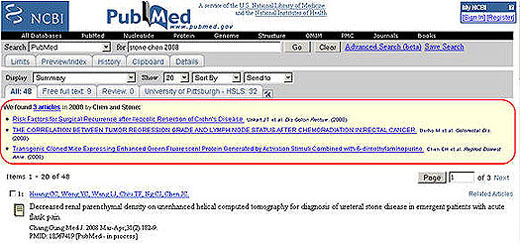


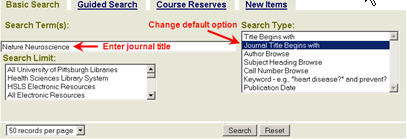

 Have you ever felt guilty about printing your lengthy PowerPoint presentation to proofread it? You won’t have to feel as culpable any longer. As of June 2008, Falk Library’s Computer and Media Center (CMC) is offering double-sided printing.
Have you ever felt guilty about printing your lengthy PowerPoint presentation to proofread it? You won’t have to feel as culpable any longer. As of June 2008, Falk Library’s Computer and Media Center (CMC) is offering double-sided printing.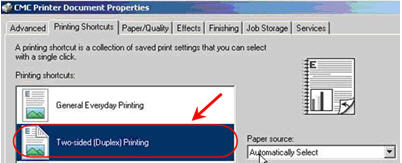
 HSLS offers library orientations and classes on database searching, software applications such as Adobe Photoshop, bibliographic management, molecular biology and genetics. For more information visit the online
HSLS offers library orientations and classes on database searching, software applications such as Adobe Photoshop, bibliographic management, molecular biology and genetics. For more information visit the online 
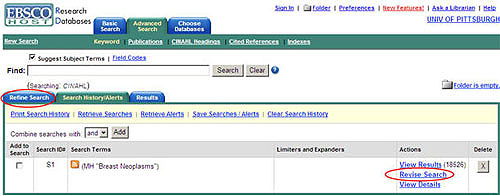


 I often encounter faculty members, researchers, and others who lament the fact that they rarely visit the library in person anymore, even though they are frequent users of our services and resources. There are lots of good reasons for this: schedules are crowded, offices are distant, or the weather is inclement. The most important explanation, of course, is that we’ve done such a good job of bringing the library to our users through licensed electronic journals and databases that users can find almost anything
I often encounter faculty members, researchers, and others who lament the fact that they rarely visit the library in person anymore, even though they are frequent users of our services and resources. There are lots of good reasons for this: schedules are crowded, offices are distant, or the weather is inclement. The most important explanation, of course, is that we’ve done such a good job of bringing the library to our users through licensed electronic journals and databases that users can find almost anything 


 Scopus, an interdisciplinary database, recently added a Document Download Manager to automatically download and save the full-text of articles, with the click of a button. This new feature will save users valuable time.
Scopus, an interdisciplinary database, recently added a Document Download Manager to automatically download and save the full-text of articles, with the click of a button. This new feature will save users valuable time.

 Click on this icon to access the full-text online version of articles that HSLS licenses.
Click on this icon to access the full-text online version of articles that HSLS licenses.
